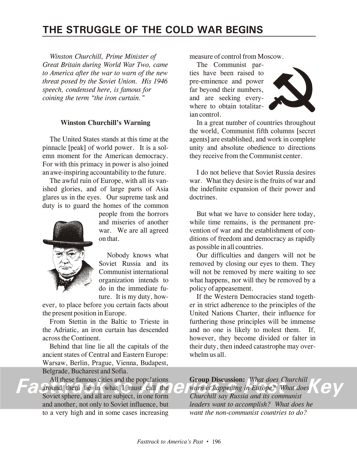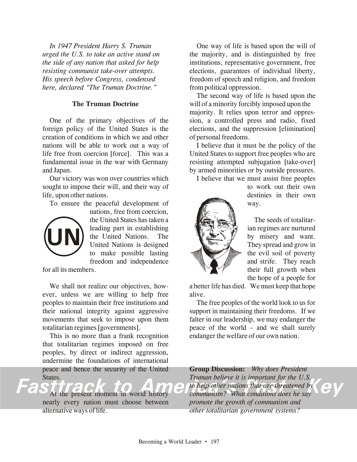| Fasttrack
to America's Past Teacher Key |
|
| Fasttrack
to America's Past Teacher Key |
|
 Page 196  Page 197 |
Page 196
& 197 - The Struggle of the Cold War Begins The reading selections These readings give a good sense of the reasons the world drifted into the Cold War after World War Two ended. In a famous 1946 speech, Winston Churchill warns that the Soviet Union is gaining control over Eastern Europe, and would continue to try to expand its power. In the second speech, President Harry Truman declares that the U.S. must be willing to come to the aid of countries threatened with a communist take-over. He also spells out clearly the choice that nations must make, a choice that comes down to freedom or oppression. The pictures 1. Winston Churchill, Prime Minister in England during World War Two. He served in that capacity again for a time during the 1950s. 2. The "Hammer and Sickle" symbol of communism. The hammer represents industry and the sickle represents agriculture. In the communist system, both are controlled by the government. 3. The common acronym for the United Nations. The organization was formed at the end of World War Two as a forum for nations to talk out their differences instead of fighting. 4. Harry S. Truman, president after the death in 1944 of Franklin Roosevelt. Truman was re-elected in 1948 in an extremely close contest. Group discussion questions, page 196 Wilson Churchill warns
that the Soviet
Union is taking advantage of the post-war situation by forcibly gaining
control over many of the nations of Eastern Europe. Group discussion questions, page 197 President Truman argues that allowing other free nations to be taken over by communist aggression would threaten international peace and therefore the security of the U.S. He points out that the United Nations was founded on the principle that all nations should be able to exist free from force. If that principle cannot be upheld, no nation can feel safe and secure. Truman points out that communism is most likely to be accepted and supported by desperately poor people who have no hope for a better life. The president says that Americans must work to keep their hope alive. In some cases, that might mean assistance to people trying to resist an armed take-over. In other cases it would mean financial and humanitarian help like the Marshall Plan.
|
|
Copyright Notice
Copyright 2018 by David Burns. All rights reserved. Illustrations and reading selections appearing in this work are taken from sources in the public domain and from private collections used by permission. Sources include: the Dover Pictorial Archive, the Library of Congress, The National Archives, The Hart Publishing Co., Corel Corporation and its licensors, Nova Development Corporation and its licensors, and others. Maps were created or adapted by the author using reference maps from the United States Geological Survey and Cartesia Software. Please see the home page for this title for more information. |